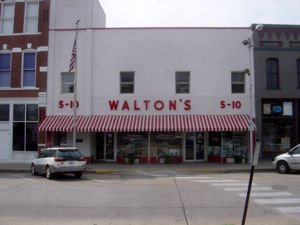
I read "SAM WALTON - Made in America" probably a month ago and have been wanting to write about it since then. I also wrote a review of the book for our company's intranet but that still wasn't done to my taste. The book hits the right cord with you because Sam Walton, started small(he was a paper boy starting at age 11, worked and paid his way through college during the depression delivering papers) and worked his way to own an empire. I do not want to review the book because I am a mere book reader who dreams and preaches how book(s) inspires but do nothing in practical to show how, now that probably is because, good books inspire me differently and that is to buy more, read more & dream more.
I am just here to put down a few anecdotes and quotes from the book and some in my own words as I couldn't get the exact lines while surfing the net, which I loved. The book is full of small stories by Sam himself and his family and colleagues. Some of the quotes & anecdotes strike with you so well that you suddenly feel you understand retail discounting business. After a reading a few quotes here, you can choose if to pick & read.
While talking about how he had to close down his first successful store because he wasn't allowed to renew his lease, he says
I had to pick myself up and get on with it, do it all over again, only even better this time.

He owned Walton's Five and a Dime which was a discount store chain, latter he ran Ben Franklin's franchisee before he owned walmart.
Competition that led him to move from being a franchisee to opening up of first Wal-Mart discount store on July 2, 1962, was this barber, Herb Gibson who had started his stores with simple philosophy:
Buy it low, stack it high, sell it cheap.
Wal-Mart wouldn't be what it is today without a host of fine competition, most especially Harry Cunningham of Kmart, who really designed the first discount store, and who in my opinion, should be remembered as one of the leading retailers of all time.
He also learnt a lot of tricks of the trade, specially book-keeping of the stores from JCPenny
Trip's Expense should be less than one percent of purchases made.
If you don't want to work weekends, you shouldn't be in retail.
Charlie Baum recalls:
We had a nice big sale, and we put barrels full of stuff all around the floor. Elderly ladies would come and bend way down over into those barrels. I'll never forget this. Sam takes a look, frowns, and says: 'One thing we gotta do, Charlie. We gotta be real strong in lingerie.
The greatest insight into retailing and discounting was told with this story: Selling more panties by pricing them a bit lower than the usual price, and hence still managed to have greater overall profit.

Name WalMart was suggested by Bob Bogle, first manager, Walton's Five and a Dime, Bentoville on a flying trip. To start with, his reason was that Walmart has just 7 letters as against earlier 'Ben Franklin' 11 letters. Hence it could save a lot of money in neon letters!! Sam didn't say anything at that time but later when Bob went by the new store's building he saw worker putting up neon signs of W-A-L and was headed up the ladder with an 'M'. He smiled and went on.
Procter & Gamble didn't pay any attention to WalMart until 1987 when WalMart began to "turn a basically adversarial vendor/retailer relationship into one that we think is the wave of the future: a win-win partnership between two big companies trying to serve the same customer." At the time biography was written, WalMart was P&G's biggest single customer!
Quite a few smaller stores have gone out of business during the time of Wal-Mart's growth. Some people have tried to turn it into this big controversy, sort of a 'Save the Small-Town Merchants' deal, like they were whales or whooping cranes or something that has the right to be protected.
Of all the notions I've heard about Wal-Mart, none has ever baffled me more than this idea that we are somehow the enemy of small-town America. Nothing could be further from the truth: Wal-Mart has actually kept a quite a number of small towns from becoming practically extinct by offering low prices and saving literally billions of dollars for the people who live there, as well as by creating hundreds of thousands of jobs in our stores.
Initially, most electronic items used to be imported from Japan and Korea alone, and latter as part of the win-win partnership they worked out deals with local American companies to buy x no of pieces every month/quarter and thus cutting down on the cost of electronic goods considerably and invariably giving the local companies a lot of sale.
To promote, Phil Green, who once made the world's largest Tide display at one of the oldest WalMart stores, promised a TV for 22 cents in a promotion to celebrate George Washington's birthday, which was on February 22nd. The only hitch was customers had to find the TV set. It was hidden in the store! The crowd brought the house down! He admitted that "playing hide-and-seek with merchandise was a terrible idea.
He did the Hawaiian shirt and grass skirt hula on Wall Street in 1984. Hula was a result of his losing bet(betting was often an another way to motivate people to do their extra bit) to David Glass that 'we couldn't possibly produce a pretax profit of more than 8 percent'.
Sam Walton wanted to be the BEST retailer and NOT the BIGGEST. According to him " There is only one boss. The customer. And he can fire everybody in the company from the chairman on down, simply by spending his money somewhere else. "

1 comment:
wow, idint read this blog yet, but ur blog is looking better and better and getting pretty organised each day :)
kudos to u.
btw i returned this morning..feelig sleepy and lazy hence not reading sam's story right now
Post a Comment